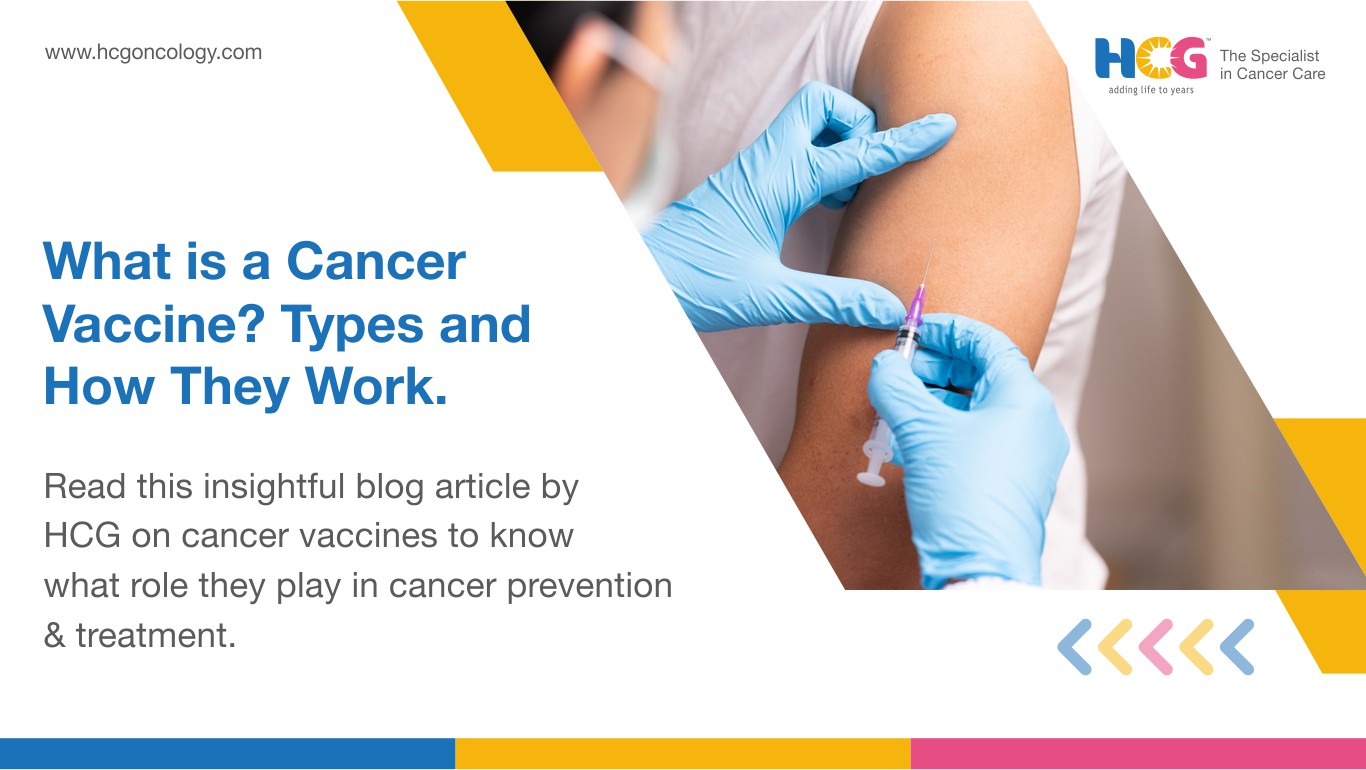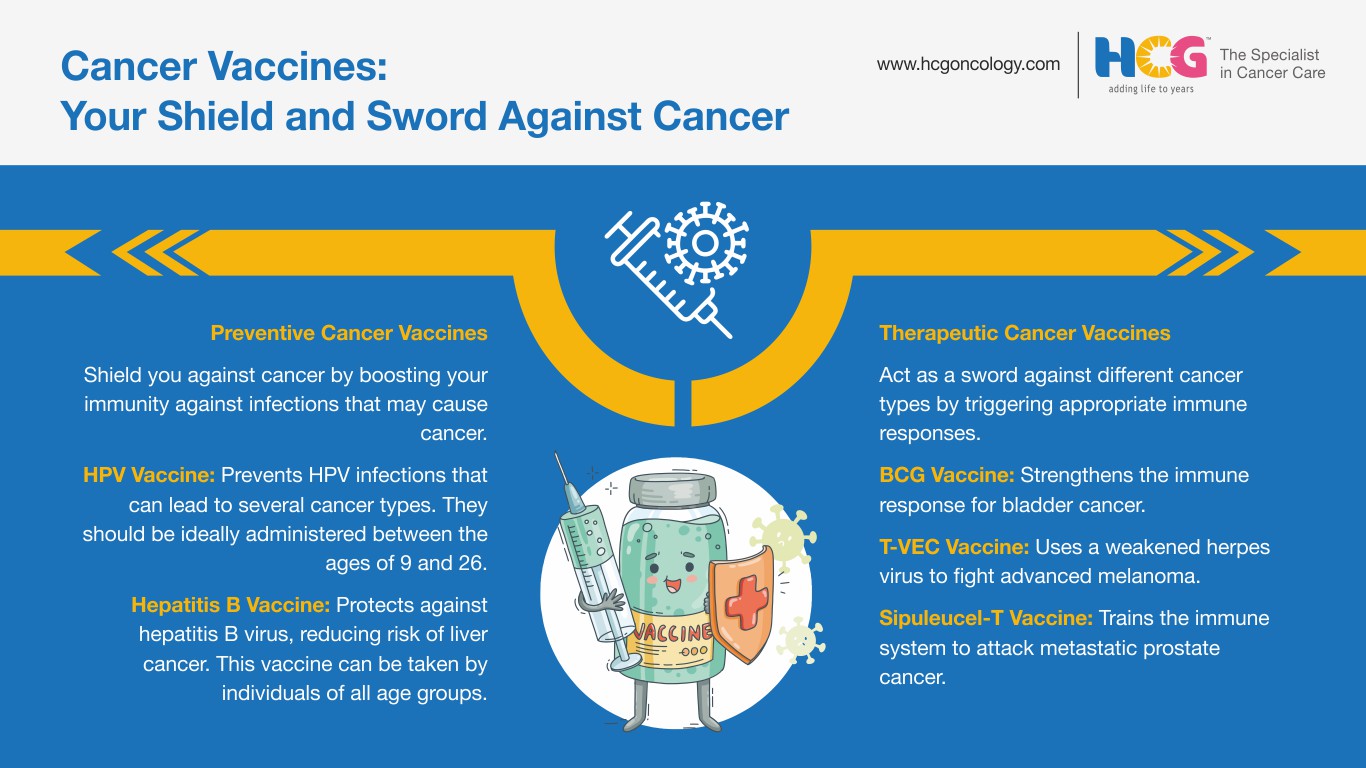
22 Dec, 2025
Feel free to reach out to us.

22 Dec, 2025

This article is medically reviewed by Dr. Kinjal Jani, Consultant - Radiation Oncology, HCG Aastha Cancer Centre, Ahmedabad.
Cancer vaccines are part of immunotherapy, which is one of the cancer therapy approaches. Their job is to signal the immune system to identify and destroy cancer cells. Cancer vaccines work by identifying and targeting specific antigens. They can be preventative and therapeutic.
Preventative vaccines, such as the HPV vaccine, are used to reduce the risk of diseases that increase the risk of cancer in humans. HPV vaccine prevents persistent HPV infections, which is one of the biggest risk factors for cervical cancer and other genital cancers.
Additional Reading: Here is an interesting read on how the HPV vaccine can help women reduce their cervical cancer risk: HPV Vaccine Reduces Cervical Cancer Risk
Therapeutic vaccines are delivered to treat cancers by training the immune system to target tumor-associated antigens (TAAs), specifically in cancer cells. Cancer vaccines often work by triggering a targeted immune response against cancer cells.
Certain cancers are linked to viral infections. In such cases, vaccines for cancer prevention work by reducing the risk of these viral infections.
For instance, certain strains of the human papillomavirus (HPV) are associated with anal, cervical, vaginal, throat, vulvar, and penile cancers. Vaccinating young adults and children with HPV vaccines, which act as preventative cancer vaccines, significantly reduces the risk of these cancers.
Similarly, chronic hepatitis B virus (HBV) infection enhances the risk of liver cancer. Vaccination with the HBV vaccine minimizes this risk.
Additional Reading: While vaccines are one of the most effective ways of reducing cancer risk, there are other preventive measures that one may adopt to reduce their cancer risk: 7 Best Ways to Reduce Your Cancer Risk.

Different cancer vaccine types are:
Protein-based oncology vaccines are developed from tumor proteins and peptides. These vaccines aim to stimulate the immune attack on cancer cells. Sipuleucel-T was approved in 2010 to treat prostate cancer by assisting the immune cells in targeting the prostate-specific protein.
Nucleic acid-based anti-cancer vaccines are made from the mRNA and DNA present in the cancer cells. These vaccines are developed to deliver genetic instructions to cells. This helps them produce the target protein, stimulating the immune attack on cancer cells. mRNA vaccines have reported efficacy against advanced pancreatic and skin cancers. Researchers are carrying out clinical research on DNA-based cancer vaccines for breast and cervical cancers, and the results have been promising.
Cell-based tumor vaccines use antigen-presenting or inactivated cancer cells with cancer antigens. Whole-cell vaccines use complete cancer cells modified in the laboratory to improve immune recognition. These cells are obtained from the patient or another donor or grown in the laboratory.
Viral vector vaccines use engineered viruses to deliver tumor antigens. These antigens stimulate the immune response against cancer cells. The viruses are altered to make them safe and not cause serious diseases. Viral vectors improve tumor antigen presentation by infecting the antigen-presenting cells. This enhances the cytotoxic T-cell response against cancer cells.
Some of the vaccines to treat cancer are:
Bacillus Calmette–Guérin (BCG) is a bladder cancer vaccine. It triggers a strong and long-lasting immune response in patients with bladder cancer. BCG vaccine helps in long-term cancer control. The combination of the BCG vaccine with other treatments, such as checkpoint inhibitors, has shown promise in treating leukemia, melanoma, and lymphoma.
Talimogene laherparepvec (T-VEC) is used to treat advanced melanoma that cannot be surgically removed. The vaccine uses the weakened herpes virus to attack the cancer cells by releasing cancer antigens. The vaccine also comprises GM-CSF, which enhances its treatment efficacy.
Preventive Cancer Vaccines: Preventative vaccines enhance the body's defense against various infections, such as herpes simplex or hepatitis B virus, that increase cancer risk. The vaccines approved for cancer prevention include the HPV vaccine and the hepatitis B vaccine.
Therapeutic Cancer Vaccines:Several vaccines are available to treat cancers. These include Sipuleucel-T to treat metastatic prostate cancer, T-VEC to treat advanced melanoma, and BCG vaccine to treat early-stage bladder cancer. Nadofaragene firadonevec is also used to treat bladder cancer that does not respond to the BCG vaccine.
Cancer vaccines for adults and children work by delivering cancer-specific antigens. It results in a strong immune response against the cancer cells. Developing a vaccine against cancer involves identifying an antigen specific to the cancer cells, not the healthy ones. These antigens are incorporated into the vaccine. Several strategies are available to select the antigens and deliver them through vaccines. The process of providing vaccines is highly personalized.
Some of the methods to deliver the vaccines are:
Direct Delivery: It involves direct delivery of the proteins and peptides with adjuvants to activate the dendritic cells, thereby initiating the immune response.
Nanoparticles: The antigens and adjuvants are encapsulated in the nanoparticles. It enhances the immune cell recognition by protecting the antigens.
Viruses: The vaccines are also developed and delivered through weakened viruses that deliver the antigen-coded DNA or RNA to generate the immune signals.
Dendritic Cells: These cells are obtained from the patients and re-engineered by loading them with antigens and adjuvants. They are then reintroduced into the patient to stimulate the immune response.
Side effects of cancer vaccines include dizziness, nausea, headaches, mild pain, redness, itching, and swelling at the site of injection. Patients may also experience flu-like symptoms, such as fatigue and fever. Those who are pregnant or breastfeeding should talk to their expert team/doctor before taking cancer vaccines, as they are not recommended for these categories.
Cancer vaccines help prevent and treat cancer by generating the immune response against cancer cells. The cancer vaccine types are protein or peptide vaccines, nucleic acid-based vaccines, cell-based vaccines, and virus vaccines. Some vaccines to treat cancer are BCG, T-VEC, HPV vaccine, hepatitis B virus vaccine, Sipuleucel-T, and Nadofaragene firadonevec. Cancer vaccines are used for the prevention and treatment of various cancers, such as cervical cancer, anal cancer, vaginal cancer, melanoma, prostate cancer, and liver cancer.

Dr. Kinjal Jani
Consultant - Radiation Oncology
MBBS, MD (Radiation Oncology)
Dr. Kinjal Jani is a highly experienced and skilled oncologist, currently serving as the director and head of the radiation oncology department at HCG Aastha Cancer Centre, a leading cancer hospital in Ahmedabad. He is an expert in the use of cutting-edge radiotherapy techniques and image-guided brachytherapy to treat a wide range of malignancies. Dr. Jani has completed extensive training and certifications in Rapid Arc and TomoTherapy in Berlin and Heidelberg, Germany, respectively.
To book an appointment with Dr. Kinjal Jani, please click here